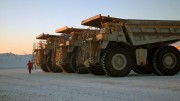Former Massey Energy CEO Don Blankenship has been convicted by a federal jury in West Virginia of conspiracy to violate U.S. mine-safety laws in relation to the 2010 explosion that killed 29 miners at the firm’s Upper Big Branch underground metallurgical coal mine in Montcoal, W. Va., 48 km south of Charleston.
While the conviction is unprecedented in U.S. mining history in that prosecutors targeted a high-ranking executive for workplace-related safety violations, Blankenship was acquitted of the more serious charges of lying to regulators and investors regarding the accident.
Caused by a build-up of methane in the underground workings, the explosion at Upper Big Branch on April 5, 2010, was the worst U.S. mine disaster since 1984, when a fire at Emery Mining Corp.’s mine in Orangeville, Utah, killed 27 miners, and 1970, when an explosion at a mine owned by Finley Coal Co. in Hyden, Ky., killed 37. The death toll also surpassed the 12 miners killed in early 2006 at International Coal Group’s Sago coal mine in West Virginia.
In the years prior to the explosion, the Upper Big Branch mine had had a history of safety violations, including improper ventilation. In the previous year, federal inspectors had fined the company US$382,000 for repeated, serious violations involving its ventilation plan and equipment.
More widely, Massey Energy had a chronically worse-than-average safety record, particularly with respect to proper ventilation, which is critical for safe coal mining.
At the time, Massey Energy was based in Richmond, Va., and ranked as one of the top-five coal producers in the U.S. In early 2011 during a high-flying period for coal miners, Alpha Natural Resources borrowed heavily to buy Massey for US$7.1 billion, or a 21% premium, to create a US$15-billion, U.S.-based coal mining behemoth. In August 2015, saddled with US$3 billion in debt amidst a collapsed coal market, Alpha Natural filed for bankruptcy protection.
Mine safety rules were substantially tightened following the high-profile Sago disaster, with U.S. President George W. Bush signing the Miner Act of 2006 into law that June. It was the first major overhaul to mine-safety legislation since the 1977 passage of the Mine Safety and Health Act.
A year before the Upper Big Branch explosion, a record amount of safety-violation fines were served at U.S. mines, partly because the Miner Act of 2006 almost quadrupled the maximum fines that could be issued by the U.S. Mine Safety and Health Adminsitration to delinquent mine operators. The picture is more complex, however, as 2009 had been the safest year in U.S. mining history, with a record low of 34 deaths, compared to 73 deaths in 2006.
But the Upper Big Branch disaster made regulators, miners and other interested parties wonder whether the 2006 reforms had unintentionally encouraged less scrupulous operators to simply incorporate the higher safety-violation fines into their cost structure, rather than deal directly with safety problems that were expensive to fix.
The hard-driving Blankenship, 65, is a polarizing figure in U.S. coal country and was notoriously the target of an extensive Rolling Stone profile in November 2010 that labelled him the “Dark Lord of coal country,” and the coal industry’s “dirtiest CEO.”
However, his conspiracy conviction is only a misdemeanour with a maximum prison sentence of a year, with sentencing to take place next March. Blankenship’s attorney told reporters outside the federal courthouse that his client would appeal the conviction, and that “this is a record which will be very full of errors on appeal.”
U.S. Attorney Booth Goodwin said that “the CEO and chairman of one of America’s largest coal companies now stands convicted. To go from boardroom to prospective incarceration sends a powerful message to executives who would ignore the safety of their workers.”
U.S. Labor Secretary Thomas Perez said the conviction shows “there must be accountability when people lose their lives because of the neglect of their employer.”
Last year, West Virginia Senator and former governor Joe Manchin said Blankenship “had blood on his hands” after the disaster.
The New York Times reported that two former Massey managers had pleaded guilty to conspiring to violate safety laws, while a former security chief at the mine was convicted of lying to investigators and trying to destroy safety-related documents, and that all three had served prison terms.




Be the first to comment on "Editorial: Former Massey CEO Blankenship convicted of conspiracy"